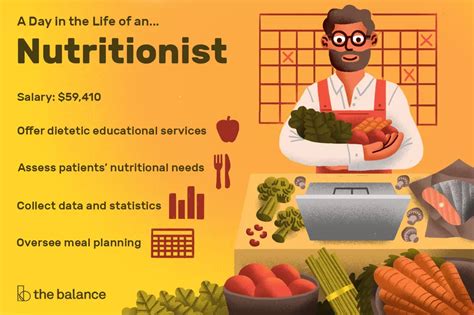Nutritionist Vs. Dietitian: Career Differences, Salary

When it comes to understanding food and its impact on health, many people turn to professionals for guidance. Two common professions in the field of nutrition are nutritionists and dietitians. While they share similarities in their focus on food and health, there are distinct differences between the two careers. In this article, we will explore the career differences between nutritionists and dietitians, as well as their salaries and the qualifications required for each profession.
1. Definition and Scope of Work
Both nutritionists and dietitians are experts in the field of food and nutrition, but their roles and responsibilities may vary.
Nutritionist
A nutritionist is a professional who advises individuals on healthy eating habits and the nutritional value of food. They may work with clients to develop meal plans, educate them on proper nutrition, and provide guidance on achieving specific health goals. Nutritionists may also work in community settings, schools, or wellness programs.
Dietitian
A dietitian is a healthcare professional who has completed a formal education and training program in dietetics. They are qualified to assess, diagnose, and treat nutritional issues and diseases. Dietitians often work in clinical settings, hospitals, or private practice, providing medical nutrition therapy to patients with specific health conditions.
2. Education and Training
While both nutritionists and dietitians focus on food and nutrition, the educational requirements differ between the two professions.
Nutritionist
In many countries, the term “nutritionist” is not regulated, meaning that anyone can call themselves a nutritionist without formal education or training. However, there are certifications and degree programs available for those who want to pursue a career as a nutritionist. These programs often cover topics such as human anatomy, physiology, biochemistry, and nutrition science.
Dietitian
On the other hand, the term “dietitian” is a protected title in many countries, including the United States, Canada, and the United Kingdom. To become a registered dietitian, individuals must complete a bachelor’s degree in dietetics or a related field, followed by a supervised practice program and a national examination. This ensures that dietitians have the necessary knowledge and skills to provide evidence-based nutrition advice.
3. Career Opportunities
Both nutritionists and dietitians have a variety of career opportunities available to them.
Nutritionist
Nutritionists can work in a range of settings, including hospitals, wellness centers, schools, government agencies, and private practice. They may specialize in areas such as sports nutrition, pediatric nutrition, or weight management. Some nutritionists also work as consultants, providing advice to food companies or developing nutrition programs for organizations.
Dietitian
Dietitians have a broader range of career options due to their extensive education and training. They can work in hospitals, long-term care facilities, outpatient clinics, private practice, research institutions, and public health agencies. Dietitians often specialize in areas such as clinical nutrition, community nutrition, food service management, or research.
4. Salary
The salary of a nutritionist or dietitian can vary depending on factors such as location, years of experience, and the type of employer.
Nutritionist
The average salary for a nutritionist ranges from $40,000 to $60,000 per year. However, salaries can be higher or lower depending on the individual’s qualifications and the demand for nutrition services in their area.
Dietitian
Dietitians generally earn a higher salary compared to nutritionists due to their specialized education and training. The average salary for a registered dietitian is around $60,000 to $80,000 per year. Dietitians who work in specialized fields or hold advanced degrees may earn even higher salaries.
5. Continuing Education and Professional Development
Both nutritionists and dietitians are encouraged to engage in continuing education and professional development to stay updated with the latest research and advancements in the field of nutrition.
Nutritionist
As the field of nutrition evolves, nutritionists can benefit from attending conferences, workshops, and webinars to expand their knowledge and skills. They may also pursue advanced certifications or specialized training in areas of interest.
Dietitian
Dietitians are required to complete continuing education credits to maintain their professional registration. This ensures that they stay current with the latest evidence-based guidelines and practices. Dietitians may also choose to pursue advanced degrees or certifications to further specialize in their chosen area of practice.
Conclusion
While nutritionists and dietitians both focus on food and nutrition, there are significant differences between the two professions. Nutritionists often provide general advice and guidance on healthy eating, while dietitians have a more comprehensive understanding of nutrition and are qualified to diagnose and treat specific health conditions. Both professions play important roles in promoting healthy eating habits and improving overall health.
Frequently Asked Questions
Q: Can a nutritionist become a dietitian?
A: Yes, a nutritionist can pursue additional education and training to become a registered dietitian.
Q: Can a dietitian work as a nutritionist?
A: Yes, a dietitian can work as a nutritionist and provide general nutrition advice. However, dietitians have a broader scope of practice and can also diagnose and treat specific health conditions.
Q: Is there a difference between a nutritionist and a registered dietitian?
A: Yes, the main difference is that the term “dietitian” is a protected title, requiring individuals to meet specific educational and professional requirements. Nutritionists, on the other hand, do not have the same level of regulation in many countries.
